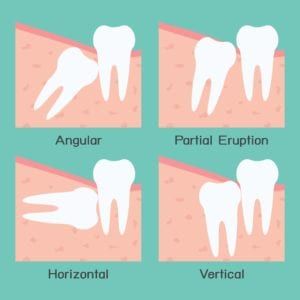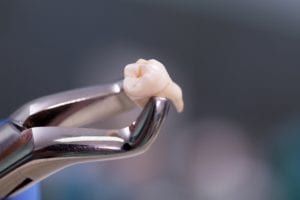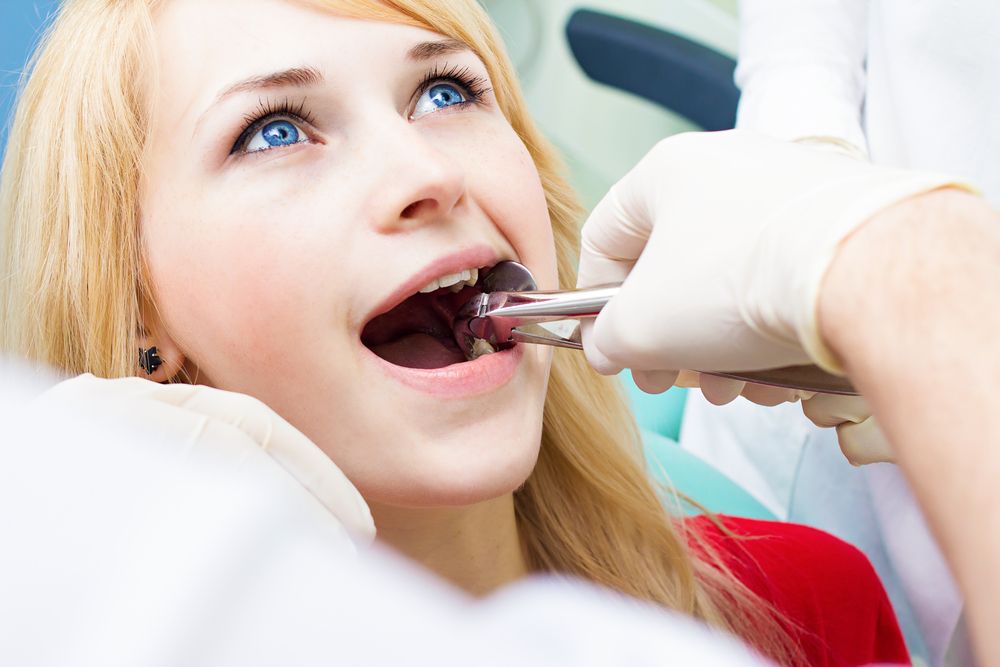Extractions are necessary dental procedures when the tooth has been severely damaged or decayed and cannot be saved through other restorative methods. It is usually performed as a last resort to prevent the surrounding structures from being damaged. The most common reason for an extraction is to remove partially or fully impacted wisdom teeth.
Did You Know?
Wisdom teeth are the last teeth to erupt and usually the first teeth to be extracted. For many people, the only extraction they will undergo is in relation to their wisdom teeth. Furthermore, lower wisdom teeth are more likely than upper wisdom teeth to require extraction because they are not part of the bite and can cause severe gum irritation.
Frequently Asked Questions:
Do I need a tooth extraction?
You may need a tooth extraction if your teeth are:
- Severely decayed: if tooth decay has entered the pulp layer, caused the roots to abscess, and cannot be helped with a root canal, your tooth will likely need to be extracted.
- Losing bone mass: if you have severe periodontal disease, your gums will recede and bone loss will start to occur, making your teeth shift or become loose. Bone loss can also be caused by poor dental hygiene, smoking, and trauma.
- Severely damaged: if your teeth are severely damaged from trauma, they may not be able to be saved. In general, this usually happens as the result of a car accident or severe sports injury.
- Impacted: if your wisdom teeth are impacted in the gums, they will likely need to be extracted.
To find out if a tooth extraction is the best dental treatment for you, schedule a consultation with Tulsa, OK dentists Drs. Chris and Kristie Vinson today.
Are my wisdom teeth impacted?
Your wisdom teeth are likely impacted if you are experiencing the following symptoms:
- Pain at the back of your mouth
- Tenderness, swelling, or bleeding in your gums
- An inability to chew on the affected side
- Swelling in your jaw or in your neck glands

Wisdom teeth can become impacted in four different ways: vertical, horizontal, and two types of angular impactions. Vertical impactions are used to describe wisdom teeth that are in the correct position and facing upwards, but haven’t yet erupted. Vertical impactions may not always require an extraction. Horizontal impactions, on the other hand, almost always require an extraction. Horizontal impactions occur when the wisdom tooth is laying on its side below the gum line. They are usually very painful because the affected wisdom tooth usually pushes up against the adjacent molar.
The different types of angular impactions are distal and mesial. Both of these angular impactions often result in extraction. Distal impaction is when the tooth is moving at an angle towards the back of the mouth, while mesial impactions is when the tooth is moving at an angle towards the front of the mouth.
How can I prepare for my tooth extraction appointment?
To prepare for your tooth extraction appointment, you will need to attend a pre-op appointment. At this appointment, your medical history, current medications, and expectations for the procedure will be discussed. If you have medical conditions such as a congenital heart defect, diabetes, liver disease, thyroid disease, renal disease, hypertension, an artificial joint, damaged heart valves, adrenal disease, immune system impairement, or a history of endocarditits, be sure to mention this during your appointment.
Once your medical history and current medications have been discussed, your method of dental sedation will be discussed. Tulsa Precision Dental offers oral, inhaled, and IV sedation. Depending on your current health and the extent of your procedure, our dentists may recommend one type of sedation over another.
Another thing that will be covered at your pre-op appointment is what to do the night before and the morning of your procedure. For most procedures, you will need to fast prior to your procedure. This means no eating or drinking after midnight. In some cases, you may also be given antibiotics to take at dinner the night before your appointment. It is very important to follow all fasting instructions and your procedure will be cancelled if you do not.
The morning of your procedure, we recommend dressing in comfortable and loose-fitting clothes. You will also want to wear well-fitting close-toed shoes. You should arrive to our office at your scheduled appointment time with a driver to take you home after the procedure. You will not be able to drive yourself home after.
What can I expect during my tooth extraction appointment at Tulsa Precision Dental?
The first thing you can expect during your tooth extraction appointment is that you will be sedated and made comfortable. Depending on your level of sedation, you may be conscious and relaxed, in a light sleep, or unconscious. Even if you are conscious during the procedure, you may not even remember what happened.

To remove your tooth, one of two extraction techniques may be used. For teeth that are already loose or that are above the gum line, a simple extraction technique is generally used. With a simple extraction, a dental tool called an elevator is used to loosen the tooth and forceps are used to lift it out of the socket.
For teeth that are partially or fully impacted, such as in most wisdom teeth cases, a surgical extraction technique will likely be used. A surgical extraction is more complicated than a simple extraction and also affects the gums. During a surgical extraction, a tiny incision is made in the gums and the gums are pulled back to expose the tooth. The affected tooth is then fragmented into pieces and each piece is removed. Although it sounds complicated, this is the safest technique to remove impacted teeth.
What should I expect after my tooth extraction?
Immediately after your tooth extraction, you can expect to feel groggy from the dental sedation. As you gradually come out of sedation, you can also expect to have cotton packed in your mouth. Although it can be uncomfortable, we encourage you to leave the cotton in place to stop any bleeding. Because your mouth will likely still be numb, you should not be in any pain after your procedure. To maintain your comfort, we recommend taking your pain medications before the anesthetics wear off.
Once you are alert enough, you will be discharged and can return home. As mentioned before, you cannot drive yourself home and will need a driver present to take you home. This person should also keep an eye on you for the first 24 hours.

During the first 24 hours, it is highly important that you avoid spitting, drinking from a straw, strenuous activity, drinking alcohol, or consuming anything hot or spicy. Ideally, you should spend the first 24 hours resting and drinking plenty of water. As the week goes on, you will need to avoid drinking from a straw and you should be a temporary diet of soft foods.
To manage pain, you can use over the counter pain medications. If these don’t seem to be working, call our office for further instructions. It is also recommended to use hot and cold therapy. For the first 48 hours cold therapy with ice packs 15 minutes on and 15 minutes off is recommended. After that heat can be used for 20 minutes on and 20 minutes off.
To manage swelling, you should sleep with your head slightly elevated. Ice is also good for reducing swelling. It is important to note that the worst day of swelling is usually the third day. Swelling will usually decrease after the third day.
At Tulsa Precision Dental, your smile is our top priority. For a full range of dental services using the latest in dental technology, schedule a consultation with Tulsa, OK dentists Drs. Chris and Kristie Vinson today!



